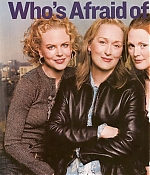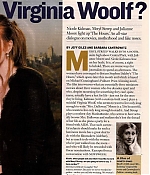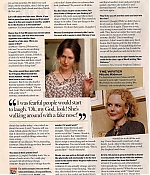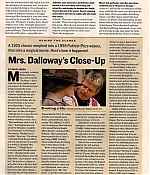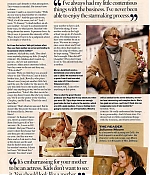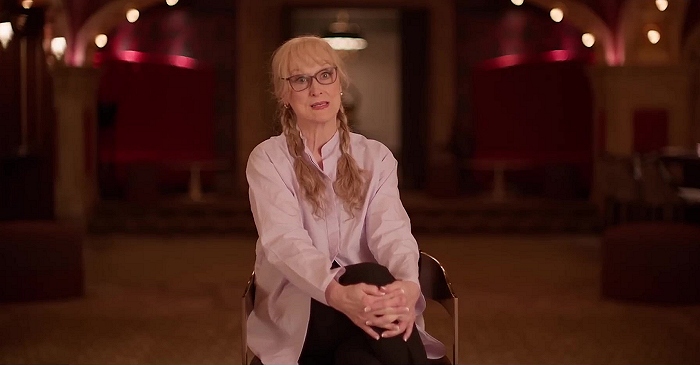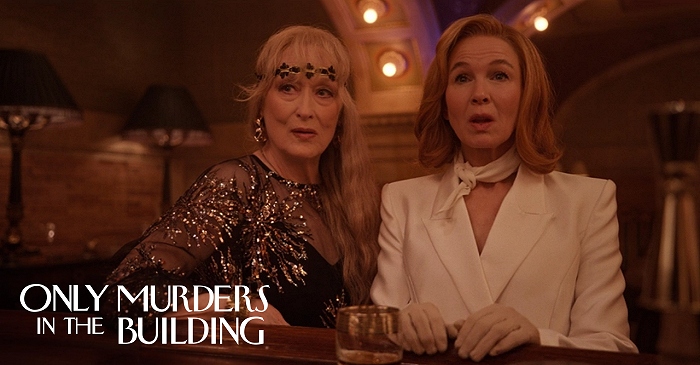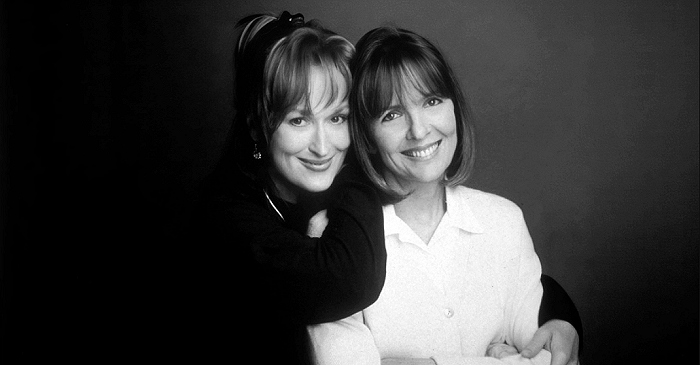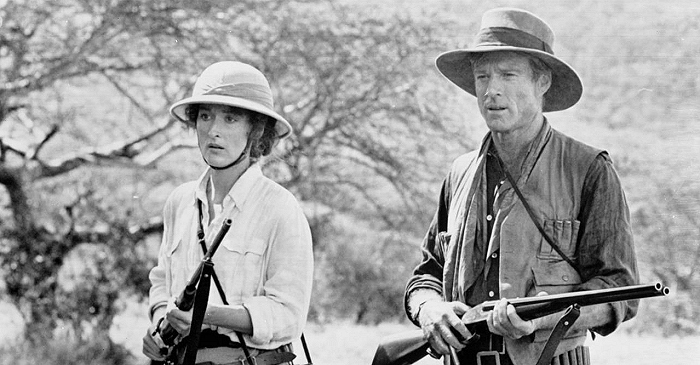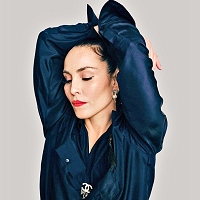|
Simply Streep is your premiere online resource on Meryl Streep's work on film, television and in the theatre - a career that has won her acclaim to be one of the world's greatest living actresses. Created in 1999, Simply Streep has built an extensive collection over the past 25 years to discover Miss Streep's body of work through thousands of photographs, articles and video clips. Enjoy your stay and check back soon.
|
|
Who's Afraid Of Virginia Woolf
Newsweek ·
December 09, 2002
· Written by Jeff Giles, Barbara Kantrowitz
| ||
Meryl Streep walks into a hotel suite high above Central Park, with Julianne Moore and Nicole Kidman close on her heels. It is, of course, a sight to behold. There are worse ways for journalists to spend an afternoon. The women have converged to discuss Stephen Daldry’s “The Hours,” which opens later this month and which is based on Michael Cunningham’s Pulitzer Prize-winning novel.
The film interweaves what are essentially three miniature movies about three women who live decades apart and who, despite mourning for something they can’t quite name, actually have a lust for life-just not for the ones they’re living. Kidman (with a custom-built nose) plays a suicidal Virginia Woolf, who seems to want to live only long enough to write “Mrs. Dalloway.” Moore is a ’50s housewife, who wants to live only long enough to read it. And Streep plays a modern-day Manhattanite, who seems to have actually become Mrs. Dalloway and realizes she’s lost the thread of her life as she plans a party for a friend with AIDS. That such sorrowful subjects should make for such a luminous movie has a great deal to do with the filmmakers, but as much to do with the women who’ve just walked into the room-and who will likely be rewarded with Oscar nominations. Excerpts from a conversation with Newsweek.
Nicole, when people ask you what it was like to work with Meryl Streep, are you going to have to say, “I have no idea”?
Nicole Kidman: [Laughs] Yes!
Meryl Streep: Because we never worked together-unless you call this working. We weren’t allowed to meet.
Julianne Moore: We didn’t see each other. Meryl went first, then I did my part and then they had a break and then Nicole did her part.
Let’s talk about the fake nose. Nicole, if you had to guess how many times you’ll be asked about it in the next couple of months, would it be in the dozens or in the hundreds?
Kidman: It’s been hundreds already, I think.
Rumor has it that Miramax was worried about the fake nose, and that there was some argument over whether there should be a fake nose. Were you aware of that?
Kidman: Harvey [Weinstein] told me I’m not to say anything. [Laughs] He actually is being supportive now. I mean, I think it is kind of a weird thing to put that on your face and then expect everyone to go, “Oh, great, we’re so pleased she’s doing that!”
The critics would have gone ballistic if Virginia Woolf looked like Nicole Kidman, though. It would have been in every review.
Kidman: But I was also fearful that the minute I walked on people would start to laugh. “Oh my God, look! She’s walking around with a fake nose!”
Moore: Somebody asked me about this earlier today-they asked me about the nose. I said, “Lemme tell you what I think about the nose!” It’s weird that it should be a problem. It used to be that people could do things when they were acting.
Streep: It’s an illusion. We’re pretending.
Kidman: Men do things to their faces and it’s not commented on.
You mean in their private lives?
Kidman: [Laughs] Probably both. No, in terms of male actors, they really play around with all of those things.
Streep: People do a lot of things that the critics don’t know about to enhance their look, you know? To present an illusion.
You don’t have to give us any names, but what kinds of things are you thinking of?
Streep: Oh, well, men put lifts in their shoes if they’re not that tall. They stand on things to be taller. They put things in the shoulders of their coats.
Kidman: Or down their pants. [Laughter]
Michael Cunningham obviously didn’t write his novel with a movie in mind. Did any of you wonder if it would work?
Moore: I read the book and thought, “They’ll never make a movie out of this.” I mean, I loved it, loved it, loved it. But I didn’t think they’d be able to do it. And David Hare’s script is astonishing and an incredible adaptation. You read a book, then you crack open the script and you think, ” This is gonna blow”-but it’s beautiful.
Nicole, can you walk us through what it was like physically and emotionally to do the first scene in the movie where Virginia walks into a river to drown?
Kidman: It was actually strange and a little eerie because I was thinking, “She did this. She looked down and found a stone and put it in her pocket and looked down and found another stone and put it in her pocket. And then she walked in and drowned herself.” And then I did it over and over again.
They’d dry you off and then send you back into the river?
Kidman: [Laughs] Well, we didn’t have a lot of coats so I didn’t really dry off. We would just do it again. There was a very, very strong current and the water was very cold. They had a bar under the water, and scuba divers, because of the current.
Moore: Really? This is terrifying!
Kidman: I don’t want to take away the illusion. But I had to grab the bar without making it look like I was grabbing the bar because if I didn’t grab the bar I would be swept off the platform and down the river.
You also learned to write right-handed so you could do the close-ups of Woolf writing “Mrs. Dalloway.”
Kidman: Yes, because Stephen [Daldry] wanted me to do all the writing. I have these really weird sort of old hands. Look-they’re like very old monkey paws. They are. My sister has them as well. But Stephen loved them.
At first, this movie is going to look like a downer to some people. How do you think the audience should feel when they leave the theater?
Streep: I’m always sort of bewildered when people say, “How do you want people to leave this movie? What do you want them to come away with?” I don’t want them to feel any which way. I hope they have the reaction that I did, which is to feel the sharpness of experience and, you know, how wonderful living is. Even though we walk around whining or in despair or in trouble for different reasons, I thought about just how beautiful it is to love someone and to be in your life. The day-to-dayness of it. The hours. I mean, that’s what I walked away with. I thought about how exquisitely this story is poised between despair and hope. That’s the way a lot of us feel a lot of the time-especially now.
Julianne, your character, Laura Brown, finds herself in this incredibly suffocating suburban life, and decides to abandon her family. Toward the end of the movie, there’s a moving scene where she tries to explain why she made that choice.
Streep: That was a controversial scene.
Moore: There were big discussions about that scene. How do you present this choice that she’s made without judging the choice, without coming down on either side? That’s the tough part.
Meryl, this particular story line must have reminded you of “Kramer vs. Kramer.”
Streep: I did feel the reverberation of that story, and I felt the same way: that there are some times where you make a horrifying choice, a terrible choice, but it’s the best choice. [To Moore] That atmosphere in that house with the little boy and you. The silence in that house. That suburban landscape. And that stultifying task ahead of you: your job is to make a cake, also make the beds, also think about dinner. That’s it. Certain creatures can’t breathe in that atmosphere. This woman is suicidal. She doesn’t have a choice.
Moore: I said to a reporter today, “Well, do you want a dead mother or a mother who has left?” And the guy said to me, “Well, it’s all the same, isn’t it?” And I went, “O-Kaaaay.” A dead mother, an absent mother-he saw it as abandonment both ways. So who knows. But that’s the thing about this movie. It presents lives. As Meryl says, it presents the intensity of life. There doesn’t have to be a judgment about it. It simply is what it is.
Is it true that actors’ kids get jealous when they see their mother on screen pretending to be someone else’s mother?
Kidman: My kids do, yeah. They don’t want anybody playing my kids. [Laughs]
Streep: My children don’t watch my movies-they’re not interested.
Kidman: Mine aren’t interested either, but they come to the set and they say, “Who is that?”
Moore: Well, my little boy was around when we did “The Hours,” and it didn’t bother him. Jack [Rovello, who plays Moore’s son] was just another little boy until he saw the trailer for the movie. He saw this little boy in the trailer and he didn’t say anything to me, but he said to his grandmother, “I don’t like that movie because she doesn’t seem like she’s my mommy.” He’ll see the poster at the Chelsea Cineplex, and he’ll say, ” That’s the one I don’t like.”
Kidman: That’s what my son says! But he doesn’t like the poster because of the nose. He doesn’t like it. Does not like it!
Streep: At Boston University, there’s a center where Bette Davis gave all of her-
Moore: Oh, I went to BU.
Streep: Did you? There’s a center where they honor her and they give this award every year. And her son was there and so I sat next to him at the dinner and he said that he hadn’t seen any of his mother’s movies. I think he’d seen “All About Eve.”
Moore: You don’t want your mother to have a job. That’s the thing. If your mother works in the high school you go to, it’s humiliating. It’s embarrassing to have your mother be an actress. We went to a magazine-cover shoot and I had on this dress that made me look like a big ole whore, and he kept saying, “Take it off. Dat’s enough. Take dat off!” [Laughter] They don’t want to see it. You should look like a mother.
Meryl, Jack Kroll wrote a NEWSWEEK cover story about you in 1980. We wanted to read a quote from it and see what you make of it twentysomething years later.
Streep: OK. I can refute anything at this point.
This is what the great theater producer Joe Papp had to say about you when you were 30: “I just hope there are enough good roles for her to play in the movies, which are still a male medium. I have a feeling she’s going to run into a lot of frustration. Meryl is still an oddball in the movie industry, no matter how interesting and complex she is. She’s too good an actress, and I don’t think she can compromise even if she wanted to.”
Moore: Wow.
Streep: He really understood the bumps in my personality. And it’s been true. I’ve always had my little contentious things with the business, and I have never been able to enjoy the starmaking process. But having said that, I’ve had so much material fall into my lap. Whatever anyone says to you, no one can strategize a career, right? We are completely will-o’-the-wisps.
Moore: It comes when it comes, man. You can’t strategize.
Do roles seem to come at a time when they’re relevant to your life somehow?
Kidman: I think Virginia’s works came into my life at a time when I was able to receive them. I mean, at school, the Bronte sisters were far more enthralling to me than Virginia. She just didn’t interest me. I was like, “Oh, how boring.” And now I just love her. I love her emotional frailty and her brilliance and the mixture in this one human being.
Over the years, you’ve not only looked for the right roles, Meryl, but for movies that fit in with your children’s school schedules.
Streep: Yes!
That’s a lot of demands to put on a career. Do you sometimes wish you could have said, “Sorry, kids, but I’m taking this one”?
Streep: I’ve never wished that. I have regretted when I’ve been away from them too long. Over the years, I came to work out what the absolute tolerable limit of time I could be out of their lives was-because, frankly, it wears on me more than them. And you can’t get that time back. It’s gone. Children acclimate very well. They’re great survivors, and especially as they get older they’re happy that you’re not around all the time. [Laughter] “Well, aren’t you going to California?! How long are you staying?” Because they know they’ll be with their dad, and it’ll be Liberty Hall. But I haven’t regretted anything, except maybe the theater.
Not doing more, you mean.
Streep: Yes, because that involves going away at night.
Moore: That’s the hardest thing to do. It’s the worst time to be gone. They really, really know and they really get upset.
Kidman: But I think what’s admirable with Meryl is… You see a woman who has managed to have the most extraordinary career and also have children, and a husband, and a richness to her life.
Streep: How do you play women if you don’t have a hand in it?
Kidman: As a person, you want to look back on your life, not back on your career. That’s the thing.
Meryl, your friend Jack Nicholson has said he thinks it’s a bad idea for women to complain about the lack of roles for older actresses. He thinks it’s a self-fulfilling prophecy, and he doesn’t get why women do it.
Streep: Well, you know, it’s like those people with great metabolisms. They go, “Why are there so many fat people?!” They just don’t understand because they can have a milkshake four times a day. Jack doesn’t understand this. There’s never been a drought, you know? He’s always been able to eat.
Years ago, you talked a lot about the difference in the way actors and actresses were treated.
Streep: I didn’t talk about it a lot. I made one speech that had an enormous [impact] because nobody talks about it-the pay disparity and everything else. It’s sort of icky to talk about it, so we don’t talk about it.
So then nothing changes?
Streep: No, actually things have changed, don’t you think? I think it’s much richer, but it’s not because of anybody’s good will. Look at “My Big Fat Greek Wedding.” If somebody in Hollywood is listening, and they’re listening for money-
Moore: That’s all they’re listening for. Money.
Streep: -they will say, “Gee, maybe ‘The Guns of Navarone’ isn’t the greatest movie that was ever made.” War pictures are interesting, but there are other things. I think men and women like different pictures and men have been in charge of picking the pictures for a long time.
Will it be easier for Julianne and Nicole to find great roles than it was for women who came before them?
Streep: Yes, because their audience will be more demanding. As you get older, you get more sort of cranky and you say, “Look, I want to see something. There has to be something at the movies for me.” I just can’t stand that there’s not much at the movies for me to see until October. And then it’s all crowded together and it’s a piranha feeding frenzy. There aren’t enough theaters. There isn’t enough room. The most wonderful pictures will be the ones that get dumped and the things that they roll out in February can have a nice long life. That’s the way it is.
But the wonderful pictures will get all the Oscars. Meryl, if you get nominated for “The Hours,” you will become the most-nominated human in Oscar history.
Moore: Wow.
Didn’t you know that? She’s in a desperate footrace with Katharine Hepburn.
Kidman: Wooh! Go, Meryl!
Moore: Beat her, beat her, beat her.
Streep: I gotta do push-ups or something.


